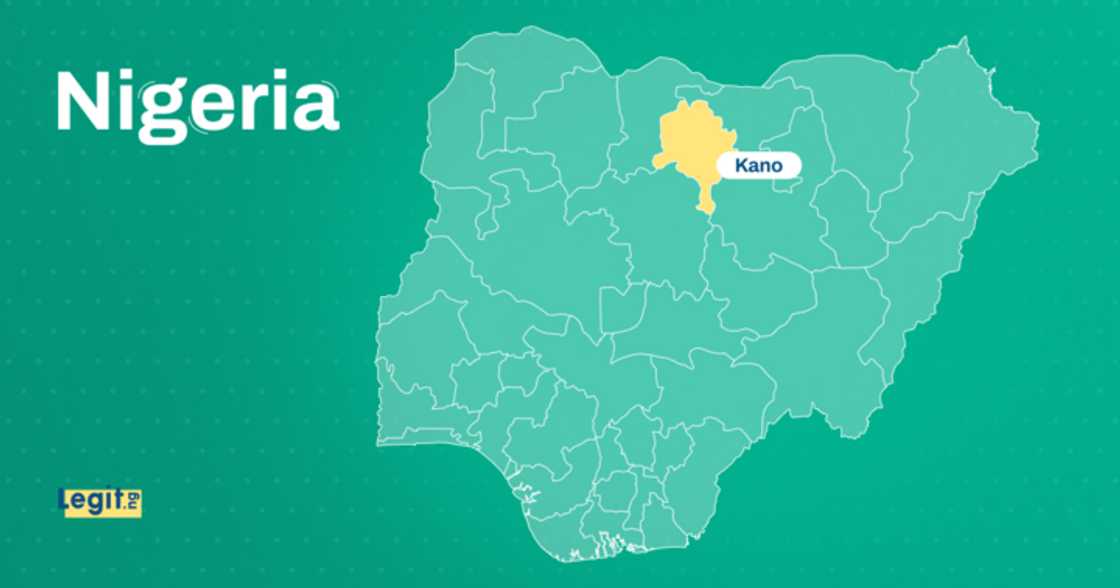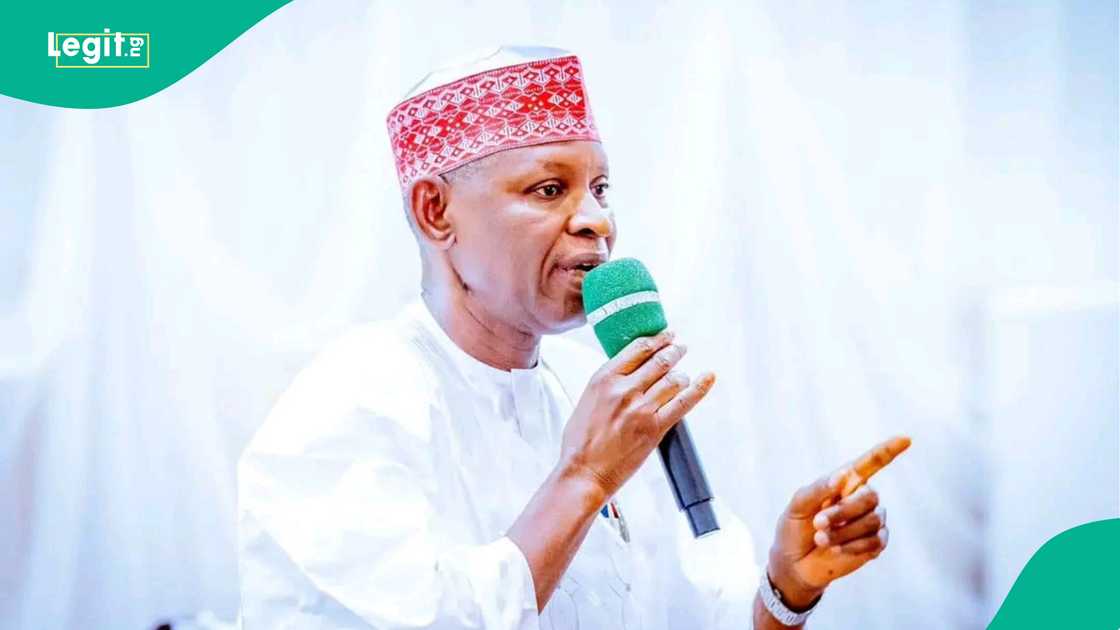In Kano State, a powerful wave of public action unfolded on Thursday as thousands of citizens rallied across major streets in a resounding demonstration supporting the Commissioner of Police, CP Ibrahim Adamu Bakori. This collective movement came in direct response to recent political tensions and growing debates over police leadership in the state.
The streets buzzed with energy as demonstrators—armed with placards and united by chants of solidarity—expressed their opposition to Governor Abba Kabir Yusuf’s widely publicized call for the removal of the police commissioner. The protest emerged after the governor’s pointed Independence Day remarks, which had accused CP Bakori of undermining the state’s security arrangements.
Kano Residents Push Back Against Governor Yusuf’s Petition
Governor Abba’s accusations included allegations of “unethical practices” and “disservice to Nigeria,” specifically citing claims that the commissioner withdrew security personnel from Kano’s anniversary parade. The tension surfaced during the governor’s speech, sparking outrage and mobilizing residents from diverse backgrounds—from market traders to university students—who insisted that CP Bakori had consistently served as a source of stability in the region.
According to on-the-ground reports and local analysts, what started as a political disagreement has now polarized public sentiment, turning a relatively contained dispute into a state-wide confrontation. This rift is symptomatic of deeper political and institutional divisions, reflecting broader challenges in balancing civic trust, law enforcement autonomy, and political oversight in Nigerian governance.
Thursday’s protest drew a large cross-section of Kano society. Demonstrators marched peacefully, insisting that the police commissioner has played a key role in maintaining security. Protesters argued that political interference could destabilize ongoing security efforts, with many warning that removing Bakori could have far-reaching implications for the state’s law enforcement and community trust.
Malam Sani Ahmed, a local trader caught up in the mass action, said, “We believe the commissioner deserves respect for his hard work. This clamor for his removal is not about justice—it seems political. The public wants stability, not turmoil.”
“This is pure politics, and we will not accept it. Commissioner Bakori has brought peace to our markets and our neighborhoods. We have seen a real change.”
“Why is the governor trying to remove a good man who is doing his job? We are here to tell the Governor to leave the Commissioner alone. If the police sense there is security intelligence the police command must react promptly,” he added.

Source: Original
Why the Protest: Local Voices, Deep Concerns
Community leaders and activists also participated in the protest, using the opportunity to highlight concerns over political interference in police affairs. Comrade Aminu Sani, a prominent women’s rights advocate in Kano, praised the police commissioner’s actions addressing child protection and other security issues: “CP Bakori has taken considerable steps to improve the safety of vulnerable groups, especially children,” he said, calling for solutions that put citizens’ welfare ahead of political disputes.
“For the first time in years, we feel our voices are heard by the police. The Commissioner has set up units that actually help us,”
“Governor Abba’s fight is not our fight. He should focus on providing good governance, not on fighting a dedicated police officer who is serving the people,” Sani explained.
For younger participants, the event became a matter of principle. Many youth activists believe that the police institution is being unfairly politicized, risking a backlash that could undermine the credibility of law enforcement. Abdulyasar Ahmad, a university student and protest participant, argued, “This isn’t the way to reform institutions. Removing a serving commissioner over political disagreements doesn’t set a good precedent.”
Experts echoed the sentiments of the protesters, warning that the politicization of police appointments, especially in volatile regions, often leads to instability. According to Lagos-based political analyst Dr. Maryam Bello, “Police leadership needs continuity and independence to function effectively. Rapid changes or interference driven by politics can create distrust among both officers and the public.”
Kano State Government’s Silence and the Road Ahead
Even as the protests made headlines across Nigeria and sparked debate among political commentators nationwide, the Kano State Government had not, as of the time of reporting, issued an official response to the unrest. This silence has only fueled further speculation about the administration’s next moves and the potential for ongoing tensions.
Governor Abba, meanwhile, has stayed firm in his position, vowing on Wednesday to submit a formal petition through the National Security Advisor to President Bola Tinubu, calling for CP Bakori’s prompt dismissal. The escalation of this local political dispute to the federal level underlines the significance of state-federal relations in security management across Nigeria.
“This is not about one man, trust me. it is about due process. If the governor has a problem, he should follow the proper channels quietly, not create a public spectacle to embarrass a federal appointee doing his job.”
“This protest is to show that the people of Kano support the police and we believe in the work CP Bakori is doing. We call on President Tinubu to ignore the governor’s petition.”
Security Leadership Challenges in Nigeria: Local and Regional Implications
The Kano case has reignited national dialogue around how security institutions are managed and the risks of politicization. Across Nigeria and neighboring West African states, debates persist about the optimal balance between police independence and necessary oversight from elected officials. Historical incidents in Lagos, Rivers, and Enugu states likewise show that abrupt changes to police command structures can challenge consistency in law enforcement and erode public trust.
Critics of the governor’s approach argue that resolving concerns about police conduct should follow judicial or administrative investigation, not unilateral demands for dismissal. Proponents, however, maintain that governors have a constitutional duty to safeguard their citizens, including stepping in when there are allegations of malfeasance or security failures.
While the situation in Kano remains tense, broader conversations are now focused on institutional reforms, greater transparency in police appointments, and increased engagement with civic organizations and local communities. Observers in Ghana, Ivory Coast, and Senegal have noted similar patterns where police leadership has sparked controversy amid local political pressure, underscoring the cross-border relevance of the issue.
Separate Incident: Man Detained in Kano for Alleged Lewd Act
In a separate development this week, social media users in Nigeria and beyond reacted to news of a 24-year-old man, Shamsu Yakubu, who was reportedly apprehended by Kano Hisbah operatives following the circulation of a viral video. The footage, which appeared to depict Yakubu in an indecent act with a she-goat, drew widespread condemnation.
Yakubu later claimed during initial questioning that the act was staged with the intention of gaining popularity on social media platforms. However, he also denied any physical contact with the animal. Hisbah officials, responsible for upholding Islamic law in Kano, condemned the alleged behavior, describing it as dangerous for both public decency and moral standards.
According to Hisbah spokesperson Ustaz Abdullahi Lawan, the agency has mandated mental health and drug addiction assessments for the suspect, while warning other citizens against sacrificing cultural and religious values for fleeting online attention. Lawan reiterated that “actions like this undermine both our faith and the dignity of the state,” and emphasized the need for robust community education on responsible social media use.
Nigeria, like many parts of West Africa, has seen a rise in controversial social media content as young people seek attention and potential financial gain online. Experts recommend greater public awareness initiatives and digital literacy campaigns to help young people make safer, more ethical choices both online and offline.
Looking Forward: A Divided Community, a Test of Governance
As Kano’s citizens grapple with these twin incidents—one spotlighting deep tensions over police governance, the other raising questions about societal values in the digital age—many are wondering what lessons will be learned. Will state authorities prioritize dialogue and reform, or will polarization continue? Civil society groups are calling for inclusive engagement with both security challenges and youth moral education to help chart a path towards social cohesion.
Globally, challenges related to police autonomy, public trust, and social media-driven behaviors are not unique to Nigeria, but the local response will help set a tone for the region. With significant stakes for security, justice, and public morality, the eyes of the nation—and West Africa—remain on Kano.
What’s your view on the unfolding security and social debates in Kano? Share your thoughts in the comments and let your voice be heard on what this means for Nigeria and West Africa going forward.










